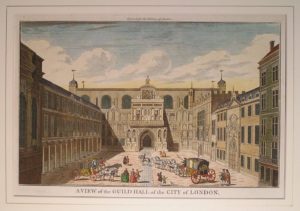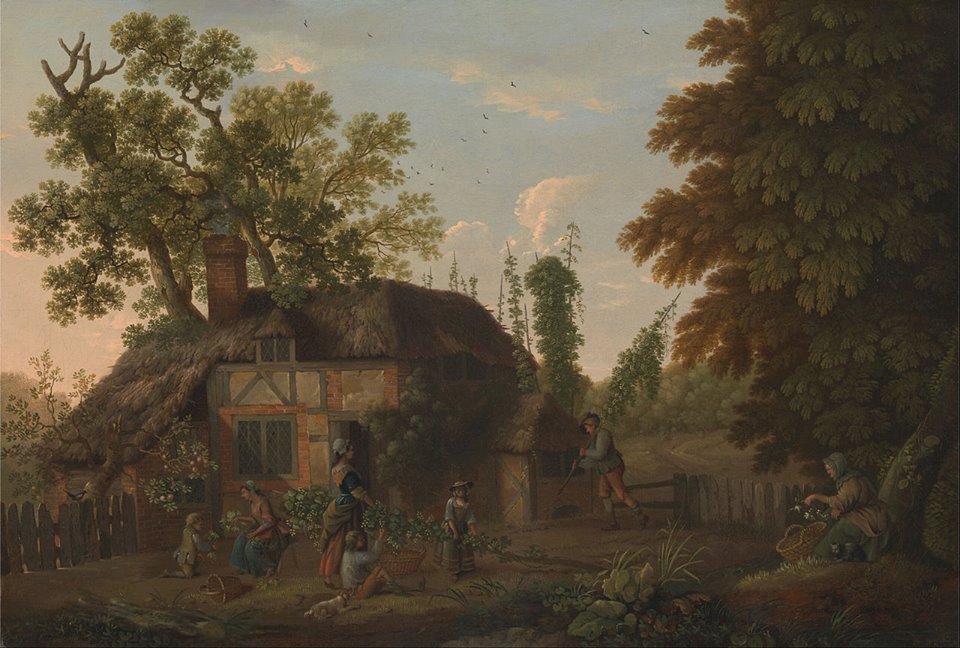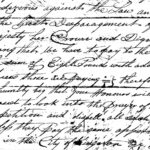
More law. And why not? Beer is largely a function of law being a rich source of revenue for the crowd and a rich source of discord within the community. And with 178 volumes of court rulings in the English Reports covering the years from 1220 to 1866, there’s likely years’ worth of content to be examined. I am trying to wrap my head around it all. The court dealing with claims of ancient or at least established custom appear as a recurring theme. Two of the hops cases in the post from a couple of weeks ago were about a form of custom, the tithe to be paid to the church by the hop growers in a parish. Local rules. There are other customs to be identified as set out in cases like these:
• In the 1817 case Gard v. Callard [1817] EngR 255; (1817) 6 M & S 69; 105 ER 1169, the following claim was brought to the court in Devon.
… the plaintiff declared upon the custom that all the inhabitants within the borough of Modbury brewing in their houses there any ale or beer for sale, ought to grind at his mills in the parish of Modbury, all the malt used or spent ground by them in their said houses, in the brewing of ale or beer for sale, and to pay him a certain toll for the grinding thereof ; and alleged that the defendant was an inhabitant, &e. and that on the 1st January 1803, and on divers other days between that and the day of exhibiting the bill, he ground at other mills.
See the odd thing? The case is heard fourteen years after the wrong is alleged to have started occurring. The defendant, Callard, had not gotten his malt processed at Gard’s mill in all that time. The fee to be paid for the grinding was ” a toll of six quarts and a pint out of every bag of twenty gallons.” If there are four quarts in a gallon I make the fee 6.5 quarts out of every 80 or 8.125% of the malt. That is a hell of a toll for just milling the malt. No wonder they wanted to go elsewhere. But the toll was upheld. The lord of the manor was to be paid because “doubtless long usage and acquiescence in one uniform payment was cogent evidence that it was reasonable.” Because the internet is wonderful, here is more information on the manorial charter as well as the mills of Modbury. I wonder how much later it was until modernity hit, how long it was before beer was being brought in by train from somewhere else, undermining the manorial toll.
• Another sort of custom was claimed in Bosworth (Chamberlain of London) against Hearne [1791] EngR 130; (1791) Andr 91; 95 ER 312:
…that anno 1663 order was made by the mayor, aldermen and commonalty reciting, that the streets of the said city were much annoyed by brewers carts and drays, and therefore it was ordained thereby, that no brewer, drayman or brewers servants, shall work or be abroad in the streets with any cart or dray from Michaelmas to Lady-Day after one of the clock in the afternoon, or from Lady-Day to Michaelmas after eleven in the morning, upon the pain of forfeiting 20 s. for every time…
I am not sure why the annoyance of the City could be put up with for two hours more from Michaelmas to Lady-Day than in the rest of the year. For those of you who do not know, Lady Day is 25 March while Michaelmas falls on 29 September. The “Lady” is the Virgin Mary and the date on the calendar goes back to before the English Church split away from Roman Catholicism. Like the long standing civic holiday, the City of London’s order of 1663 was upheld as still good law in 1791. The fine for late deliveries was still good local law.
• The next case, Greene versus Cole, is harder to follow but it is laced with references to “custom” and “brew” which in itself qualifies it. The dispute relates to a will. A lot of these cases about breweries relate to a dispute in a will. But this one has a particularly spicy aspect – a charge of waste (perhaps as against the custom of the City of London) as set out in the ruling:
… the said Henry did make waste, sale, and destruction in the said house and messuage, that is to say, by prostrating a brew-house parcel of the said messuage of the price of 1000 [pounds], and taking away and selling the timber and roof thereof; and also by pulling down, pulling oft, and carrying away four ale-tuns fixed to the said brew-house, each of them of the price of 5 [pounds], a copper of brass covered with lead likewise fixed to the said brew-house, of the price of 200 [pounds], a mash-tun likewise fixed to the said brew-house, of the price of 20 [pounds], a pump erected in the said brewhouse, of the price of 5 [pounds], six brewing vessels called coolers made of timber likewise fixed to the said brew-house, each of them of the price of 6 [pounds], a malt-mill with a small millstone belonging to the said mill fixed in the ground in the said brew-house, of the price of 20 [pounds], and a cistern made of a cement called plaster of Paris, and fixed in the ground in the said brew-house, of the price of 10 [pounds], to the disinheriting of the said William, and against the form of the provision in such case provided ; wherefore he says that he is injured, and has damage to the value of 1000 [pounds] and therefore he brings suit…
Short version: the tenant (of a sort) tore down the brewery. The owner (of a sort) got upset. The brewery itself was “commonly called or known by the name or sign of the Flower de Luce” and was on Golding Lane (later Golden Lane) in the parish of St. Giles without Cripplegate, London. [See more about the brewery here.] There are two versions of the case that I see: Greene versus Cole [1845] EngR 97; (1845) 2 Wms Saund 228; 85 ER 1022 as well as Greene versus Cole [1845] EngR 98; (1845) 2 Wms Saund 252; 85 ER 1037. As you can see, the two cases were published in the same year, the second appearing to be a form of appeal. The passage set out above is from the first of the two. The second one explains what is going on a bit better. The first court hearing is before the “hustings,” a court of the city of London, held before the Lord Mayor, the sheriffs and aldermen. It handled matters related to land, common pleas, appeals from sheriffs and probate – or disputes over wills like in this case. Beadles are called in. Jurors are rounded up from the wards around the location of the brewery to advise what they think was going on. The hearing was held in the still standing Guildhall, illustrated above in the 1750s. The custom in this case is all about local municipal process. But the cases are not from 1845. They are from the 20th year of Charlies II, republished to illustrate the point being made in law. As a result, they also illustrate the value and the elements of a brewery from the 1680s. It had a cement cistern. Who knew? Again… neato.
That is enough for today. This ain’t easy reading.

 In 1807, a correspondent who went by the name “The Plain Dealer” wrote a letter to the editor of The Morning Chronicle on the topic of
In 1807, a correspondent who went by the name “The Plain Dealer” wrote a letter to the editor of The Morning Chronicle on the topic of 
 Six thirty Ay Hem. That’s what you get when you go to bed early on a Friday. After having a nap around supper time. That’s how I think of myself on this sort of Saturday.
Six thirty Ay Hem. That’s what you get when you go to bed early on a Friday. After having a nap around supper time. That’s how I think of myself on this sort of Saturday. 